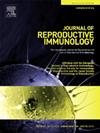与肥胖妇女妊娠代谢并发症相关的孕早期代谢特征。
IF 2.9
3区 医学
Q3 IMMUNOLOGY
引用次数: 0
摘要
简介孕产妇体重指数(BMI)较高与代谢紊乱和妊娠并发症有关。我们旨在研究肥胖(体重指数≥ 30 kg/m2)妇女的孕早期代谢特征是否与妊娠代谢并发症有关:巢式队列研究来自一项前瞻性纵向队列(n = 1031),研究对象为 2002-2008 年间在奥斯陆大学医院分娩的孕前健康妇女。样本中有 81 名肥胖妇女。妊娠代谢并发症包括妊娠糖尿病、妊娠高血压和子痫前期。我们通过核磁共振光谱分析了孕 14-16 周的血浆样本中的 91 种代谢物。我们进行了主成分分析,以减少代谢维度。我们建立了逻辑回归模型,以估算妊娠代谢并发症的粗略和调整后的几率比(ORs):81名妇女中有24名出现了代谢性妊娠并发症(妊娠高血压、子痫前期和/或妊娠糖尿病)。五个主成分中的两个(80% 的解释方差)与代谢性妊娠并发症有显著相关性。单不饱和脂肪酸与总脂肪酸之比会增加妊娠代谢并发症的风险(OR 2.09,95 % 置信区间 [CI] 1.25-3.75),而多不饱和脂肪酸与单不饱和脂肪酸之比会降低风险(OR 0.54,95 % CI 0.30-0.89)。ω-3脂肪酸与总脂肪酸的比率(OR 0.59,95 % CI 0.34-0.98)和二十二碳六烯酸与总脂肪酸的比率(OR 0.57,95 % CI 0.31-0.97)也降低了妊娠代谢并发症的风险:结论:妊娠早期的代谢状况与肥胖妇女妊娠代谢并发症的风险有关。我们观察到脂肪酸组成与代谢性妊娠并发症之间的关系最为密切。本文章由计算机程序翻译,如有差异,请以英文原文为准。
Metabolic profiles in early pregnancy associated with metabolic pregnancy complications in women with obesity
Introduction
Higher maternal body mass index (BMI) is associated with metabolic disturbances and pregnancy complications. We aimed to examine whether metabolic profiles in early pregnancy were associated with metabolic pregnancy complications in women with obesity (BMI ≥ 30 kg/m2).
Material and methods
Nested cohort study from a prospective longitudinal cohort (n = 1031) of women who were healthy prior to pregnancy and gave birth at Oslo University Hospital from 2002–2008. The sample comprised 81 women with obesity. Metabolic pregnancy complications included gestational diabetes mellitus, gestational hypertension and preeclampsia. In plasma samples from gestational weeks 14–16, 91 metabolites were analyzed by nuclear magnetic resonance spectroscopy. We performed a principal component analysis to reduce the metabolic dimensions. Logistic regression models were fitted to estimate crude and adjusted odds ratios (ORs) of metabolic pregnancy complications.
Results
Twenty-four out of 81 women developed metabolic pregnancy complications (gestational hypertension, preeclampsia, and/or gestational diabetes). Two of five principal components (80 % explained variance) were significantly associated with metabolic pregnancy complications. The ratio of monounsaturated to total fatty acids increased the risk of metabolic pregnancy complications (OR 2.09, 95 % confidence interval [CI] 1.25–3.75), while the ratio of polyunsaturated to monounsaturated fatty acids decreased the risk (OR 0.54, 95 % CI 0.30–0.89). The ratio of omega-3 to total fatty acids (OR 0.59, 95 % CI 0.34–0.98) and the ratio of docosahexaenoic acid to total fatty acids (OR 0.57, 95 % CI 0.31–0.97) also decreased the risk of metabolic pregnancy complications.
Conclusion
Metabolic profile in early pregnancy was associated with risk of metabolic pregnancy complications in women with obesity. We observed the strongest associations between fatty acid composition and metabolic pregnancy complications.
求助全文
通过发布文献求助,成功后即可免费获取论文全文。
去求助
来源期刊
CiteScore
6.30
自引率
5.90%
发文量
162
审稿时长
10.6 weeks
期刊介绍:
Affiliated with the European Society of Reproductive Immunology and with the International Society for Immunology of Reproduction
The aim of the Journal of Reproductive Immunology is to provide the critical forum for the dissemination of results from high quality research in all aspects of experimental, animal and clinical reproductive immunobiology.
This encompasses normal and pathological processes of:
* Male and Female Reproductive Tracts
* Gametogenesis and Embryogenesis
* Implantation and Placental Development
* Gestation and Parturition
* Mammary Gland and Lactation.

 求助内容:
求助内容: 应助结果提醒方式:
应助结果提醒方式:


